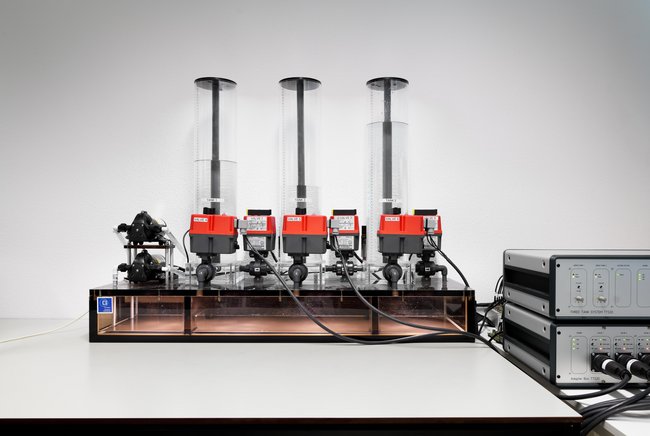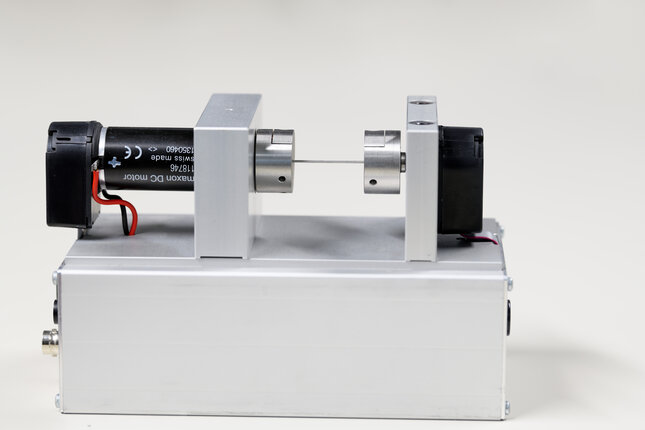Practical classes from home thanks to Remote Labs

Despite the closure of campus, a number of students will still be able to take part in practical classes during the upcoming quartile; simply from home. This is possible thanks to Remote Labs, an initiative by the Control Systems group of Electrical Engineering. With this, students can login 24/7 to operate a few test setups. The plan is to expand Remote Labs within TU/e in time, and applied sciences universities Fontys and Avans have also expressed an interest already.
Remote Labs originated from a Bachelor’s final project from a few years ago, says assistant professor Leyla Özkan of Control Systems. “I teach the course Process Dynamics and Control to Chemical Engineering and Chemistry students. That course is of a very mathematical nature, and I believed it was important that the subject should have a practical component to make it more tangible. However, we don’t have room in Flux for an extra lab with test setups for a group of chemistry students.” There was room though for one single test setup that could be operated from a distance by students at their convenience, was the idea.
“We developed this further during the last couple of years,” Özkan says. “A BOOST grant allowed us to professionalize the system. We integrated Remote Labs into the course Process Dynamics and Control this quartile, and tested it as such with 47 chemistry students.” The test setup in question consists of three connected water tanks, and the assignment is to keep the water levels within certain limits. To achieve this, the students can operate two pumps and open or close valves, while they get real time information about the water levels via sensors.

Experimenting at night
The development of Remote Labs is mostly prompted by the sharp increase in the number of students, stresses Will Hendrix, responsible for the test setups from within Control Systems. “Current practical classes are usually scheduled on two afternoons, and with about two hundred and fifty first-year Electrical Engineering students that means we need a serious number of test setups and, correspondingly, enough lab space. However, Remote Labs allows students to determine for themselves when they want to use the setup, literally 24/7, including at night if they want. Experience teaches us that students have a need for flexibility in their study approach, and Remote Labs corresponds with that.”
The system is fitted with a planning tool with which students can see when the equipment is available and book timeslots. No one was physically present at the test setups during the pilot, which was completed last week, due to the closure of campus. The system sends out a warning to the administrator in case anything goes wrong unexpectedly, Hendrix says. “But that hasn’t happened yet, which is a sign that the system is quite robust.”
Challenge-based learning
In addition, Remote Labs offers the possibility to arrange the practical classes more along the lines of ‘challenge-based learning,’ Hendrix explains. “Because the regular practical classes take place at fixed times, students need to start well-prepared, and they could become pressed for time when something goes wrong. With Remote Labs, you can pause an experiment to sort some things out after which you resume the practical class at a later stage. This also makes it possible to formulate the assignments a bit more freely; that’s completely in line with the challenge-based learning the university has in mind.”

The setups, five of which have been made at this point, are operated with software that was developed in collaboration with TU/e’s Equipment & Prototyping Center. The other software, such as the user interface, planning tool and the like, were made by Wolfpack, a software company located at the TU/e campus that employs many of the university’s alumni.
Corona
Even though the makers of Remote Lab didn’t see the corona crisis coming, naturally, the current closure of campus is the reason however why the implementation of this system will be sped up during the next quartile for two courses: one from the Master Systems and Control, the other an Electrical Engineering Bachelor’s course. Hendrix: “We calculated that all approximately two hundred and fifty students will be able to use the system with four setups instead of a minimum of twenty. This involves operating small motors of which the shaft is connected to a mass that creates a torque.”
The intention is that other faculties will also use Remote Labs in time. The Control Systems Technology group from within Mechanical Engineering showed interest already, says Özkan. “But Remote Labs can be employed more broadly than just for control technology,” she emphasizes. Hendrix adds: “The system is flexible; you can connect all kinds of setups to it. It’s scalable as well, because it allows you to operate several setups simultaneously. We are already talking to applied sciences universities Fontys and Avans about how they could use Remote Labs in their education, either with their own setups or by logging into ours.”
Source: Cursor (author Tom Jeltes).